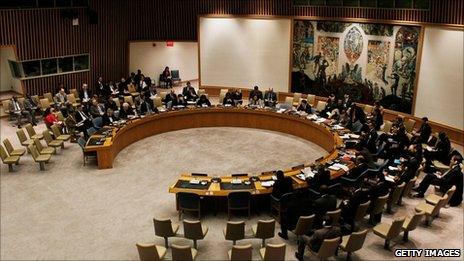Libya: Coalition divided on arming rebels
- Published

The question of whether or not UN Security Council resolution 1973 allows countries to arm Libya's rebels is becoming more pressing as the rebel advance struggles to overwhelm Col Muammar Gaddafi's tanks and rockets.
It is also becoming more contentious, with different emphasis from different members of the coalition.
Paragraph 4 of resolution 1973 authorises the use of "all necessary measures, notwithstanding paragraph 9 of resolution 1970", to protect Libyan civilians "under threat of attack".
The use of the word "notwithstanding" has government lawyers in different capitals opening their textbooks and offering advice.
Notwithstanding is a lawyerly word meaning "in spite of". It was an American amendment during the negotiations over the text of the resolution.
'Exception'
Paragraph 9 of resolution 1970 imposed an embargo on the sale of arms to Libya.
But resolution 1973 suggests that all necessary measures can be used to protect Libya's civilians, in spite of the arms embargo - and, therefore, that arming the rebels could be justified if it would save those under threat of attack.
US Secretary of State Hillary Clinton told CBS on Sunday that the Obama administration had not made a decision about whether to arm the Libyan opposition, but believed it had the right to do so.
"The reason is because there is an arms embargo against the Gaddafi regime that was established in the first resolution, resolution 1970, which applied to the entire country," she explained.
"In the follow-on resolution, 1973, there is an exception, if countries or organisations were to choose to use that."
Across the Atlantic on the same day, UK Defence Secretary Liam Fox told the BBC: "We're not arming the rebels. We're not planning to arm the rebels."
Dr Fox said there was a UN arms embargo across Libya, adding: "We have to accept that."
However, UK Foreign Secretary William Hague sounded more equivocal after Tuesday's conference on the future of Libya in London.
Asked about arming the rebels, he told reporters: "Those resolutions in our view apply to the whole of Libya, although it is consistent with resolution 1973 to give people aid in order to defend themselves in particular circumstances."
'Bitter taste'
At the UN in New York, there has been discussion about whether arming the rebels would be an exemption to the arms embargo requiring authorisation by the Sanctions Committee.
The committee chair, Portugal's permanent representative, Jose Cabral, says that his understanding is that "the resolution imposes a full embargo on arms".
The position of the French government is publicly more ambiguous.
Asked whether the resolution allowed the rebels to be armed, the French permanent representative, Gerard Araud, replied: "We are implementing the resolution to the letter."
The divisions in the UN Security Council make the question of arming the rebels a fraught one.
Five countries abstained rather than vote for the resolution - Brazil, India, Germany, China and Russia.
Already, Russia has been very critical of the coalition action.
"We consider that intervention by the coalition in what is essentially an internal civil war is not sanctioned by the UN Security Council resolution," said Russian Foreign Minister Sergei Lavrov on Monday.
One Security Council diplomat says: "It would leave a bit of a bitter taste if anyone interpreted it as a blanket authority to arm the rebels - you'd lose political credit."
The legality of UN resolutions has been a political flashpoint since the 2003 invasion of Iraq.
France refused to back a resolution authorising the invasion, leaving the US and UK governments to argue that previous resolutions justified the use of force against Saddam Hussein.
Arming the rebels would be controversial because it could look like an attempt to overthrow Col Gaddafi and bring about regime change, rather than to protect civilians, which is the stated aim of the UN-backed action.